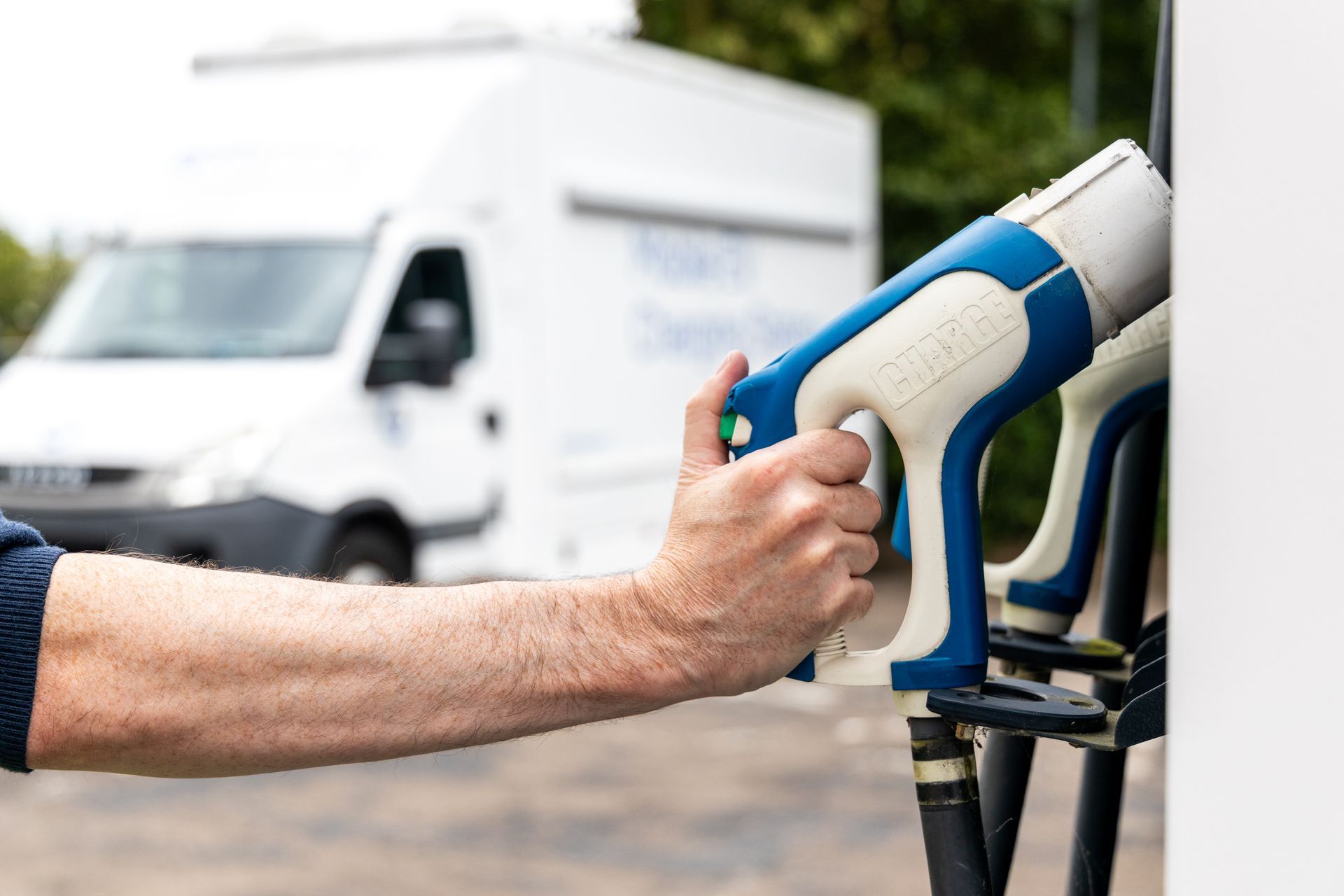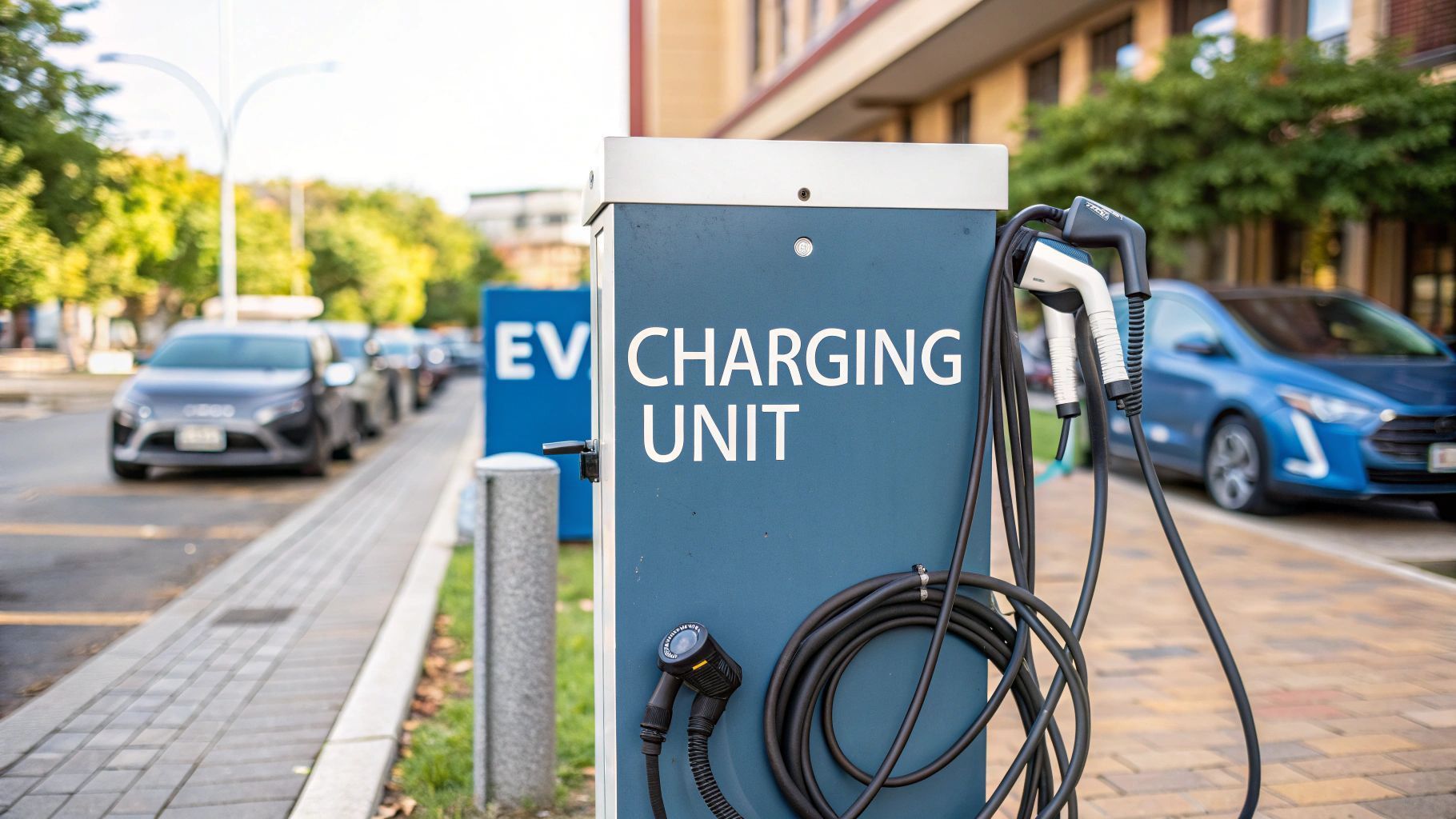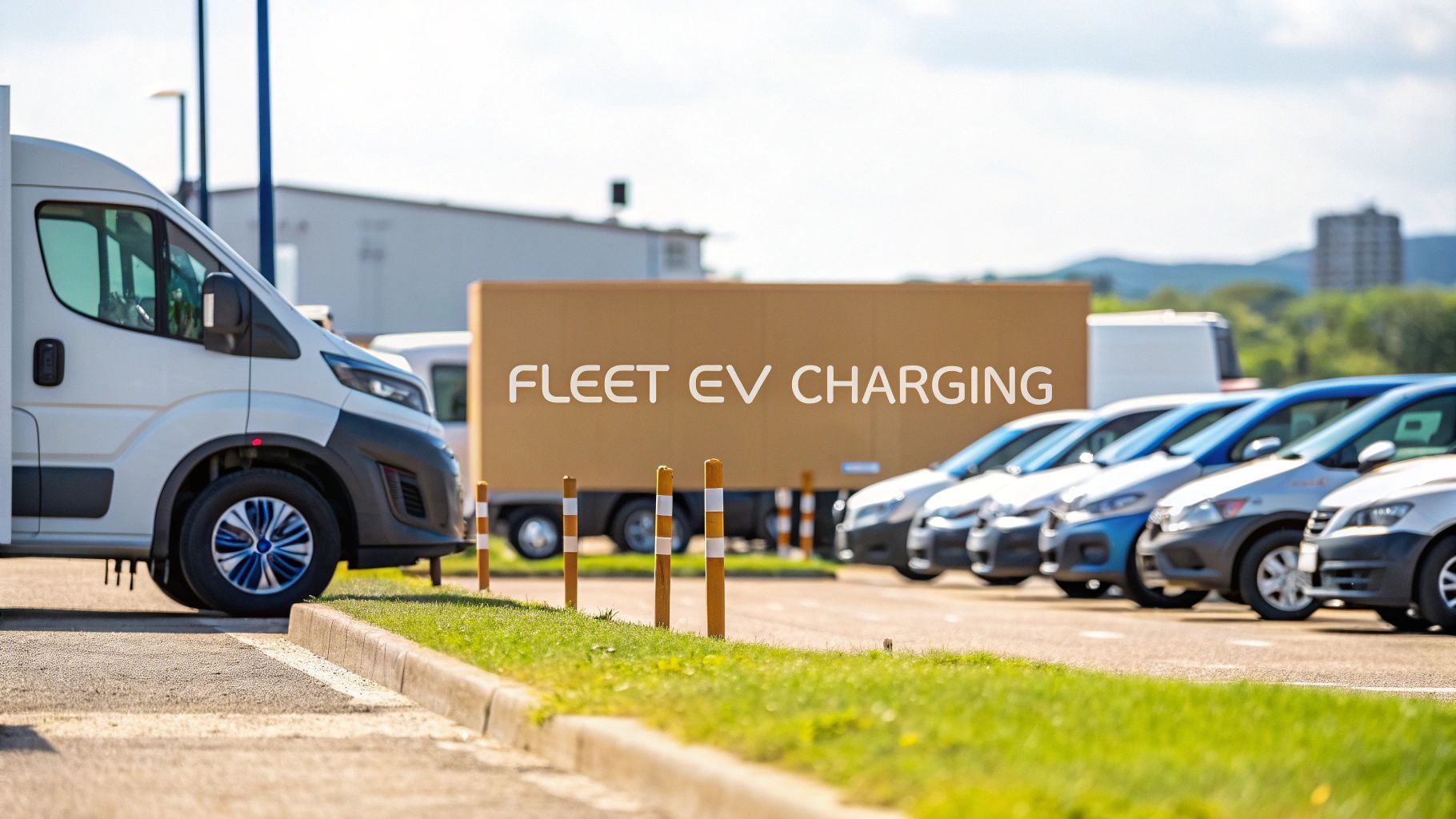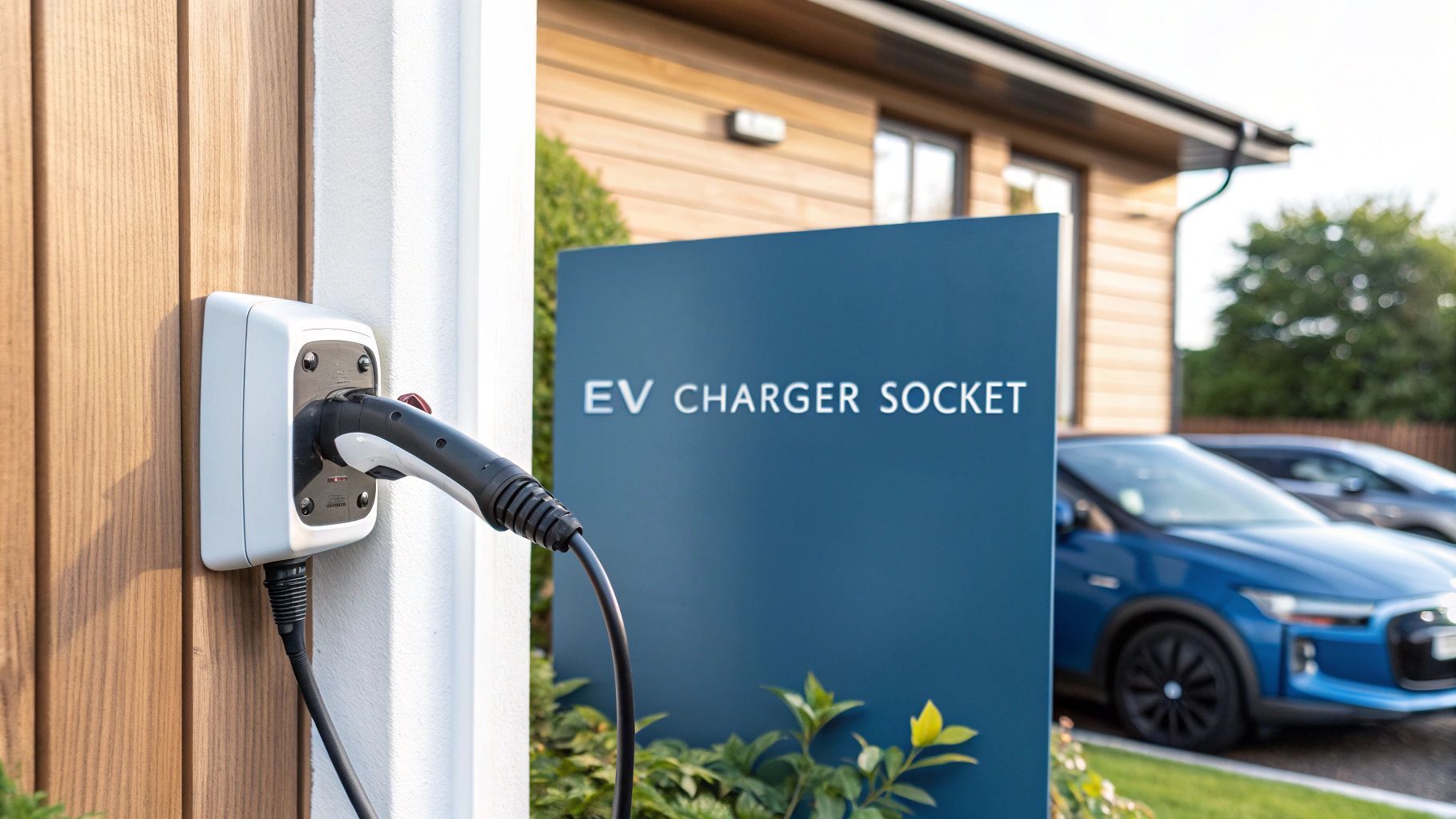Ultimate Guide to EV Charging at Hotels for Better Bookings
Providing EV charging for hotels is no longer just a nice-to-have perk. It has become a critical amenity, one that directly shapes booking decisions for a fast-growing and affluent group of travellers.
For this crowd, a hotel without charging facilities is practically invisible. They plan entire road trips around where they can get a reliable overnight charge, and if you do not offer it, you simply will not show up in their search results. Adding this service is a surefire way to secure more bookings, encourage guests to stay longer, and boost spending across your entire property.
The New Must-Have Amenity for UK Hotels
The quiet hum of an electric vehicle in a hotel car park is becoming a familiar sound all over the UK. This is not a fleeting trend; it is a fundamental shift in how people travel. Today's EV driver is a planner, and their first thought after booking a room is, "Can I charge my car overnight?"
For these guests, the search for a hotel does not start with the spa menu or restaurant reviews. It starts with a single filter: "EV charging." If your hotel does not tick that box, you are out of the running before you even have a chance, no matter how fantastic your other facilities are. You effectively become a blind spot for a very valuable slice of the market.
The Scale of the Opportunity
The growth in electric vehicle ownership has been absolutely staggering. By the end of 2024, the UK had around 1.36 million fully electric vehicles on its roads—that is a sixfold increase since just 2020. This explosion is hitting the hospitality sector head-on, but there is still a massive gap. Despite the demand, only about 1 in 5 hotels in the UK currently offers EV charging, leaving the door wide open for forward-thinking hoteliers.
This is not just a statistic; it is a tangible missed opportunity. Picture a couple planning a weekend trip from London to the Cotswolds. Their entire itinerary is dictated by charging points. A hotel that offers them a seamless overnight charge immediately becomes their first choice, guaranteeing you their booking and all the money they will spend during their stay.
A hotel's car park is no longer just a place for guests to leave their cars. It is an energy hub, a crucial part of the modern travel experience, and a powerful, untapped revenue centre.
Turning an Amenity into Profit
The benefits go way beyond just attracting a new type of guest. While their car is charging, your guests are a captive audience, far more likely to spend money on-site.
Think about it. They will probably:
- Dine in your restaurant: Why drive out to find a meal when they can relax and eat right where they are staying?
- Use your bar or lounge: A relaxing drink is much more appealing when they know their car is being sorted for the next day.
- Book spa treatments: The downtime while charging is the perfect excuse to indulge in your other services.
- Stay longer: A hotel that acts as a reliable "base camp" for charging encourages multi-night stays, as guests use your location to explore the surrounding area.
By not offering EV charging, hotels are basically sending potential customers—and their spending money—straight to the competition. This conversation has moved on from just being about sustainability; it is now about market relevance and making sound financial sense.
For those curious about how on-demand solutions fit into this picture, you might be interested in the benefits of mobile EV charging for your hospitality business. This simple addition can transform your hotel from just another option into a go-to destination for the modern traveller.
Why Mobile Charging Outsmarts Fixed Installations
Choosing the right EV charging solution for your hotel can feel like a huge commitment, but it does not have to mean digging up your car park or sinking a massive upfront investment. While fixed charging points have their place, a much more agile and financially savvy alternative is quickly gaining ground in the hospitality industry: mobile charging. This approach flips the traditional model on its head, letting you bring the power directly to your guests, wherever they happen to park.
This flexibility is a game-changer. Instead of dedicating prime parking spaces to EV charging—which then sit empty and useless when a petrol car parks there—mobile units allow every single bay in your car park to become a potential charging spot. It is a brilliantly simple way to serve the growing wave of EV drivers without sacrificing valuable parking for your other guests.
Lower Costs And Immediate Returns
Let's be honest, the most compelling argument for mobile charging is the financial one. Installing fixed charging points is a significant capital expense, often running into thousands of pounds per unit once you factor in groundwork, cabling, and electrical upgrades. These projects are disruptive, too, sometimes taking weeks to complete and creating a real headache for your guests and operations.
Mobile charging, on the other hand, just sidesteps most of these costs.
- No Construction Hassles: You completely avoid the need for digging trenches, laying extensive underground cables, and resurfacing your car park. This means zero disruption to your daily business.
- Minimal Upfront Investment: The initial outlay for a fleet of mobile chargers is substantially lower than for a bank of fixed units. This lets you get into the market and start generating revenue almost immediately.
- Scalability On Demand: You can start small with just a few mobile units and expand your fleet as guest demand grows. This "pay-as-you-grow" model protects your cash flow and ensures you are never over-invested in infrastructure.
By sidestepping the immense costs and complexities of fixed installations, hotels can begin offering a premium EV charging service and see a return on their investment far quicker. It transforms a potential financial burden into an immediate revenue opportunity.
Unmatched Flexibility And Guest Convenience
The operational agility you get with mobile charging is something fixed installations simply cannot match. A mobile solution lets you adapt to the natural ebb and flow of the hospitality business, from quiet weekdays to sold-out event weekends.
This is all about integrating a new service seamlessly into your existing operations, with a laser focus on the kind of guest convenience that drives loyalty and glowing reviews.
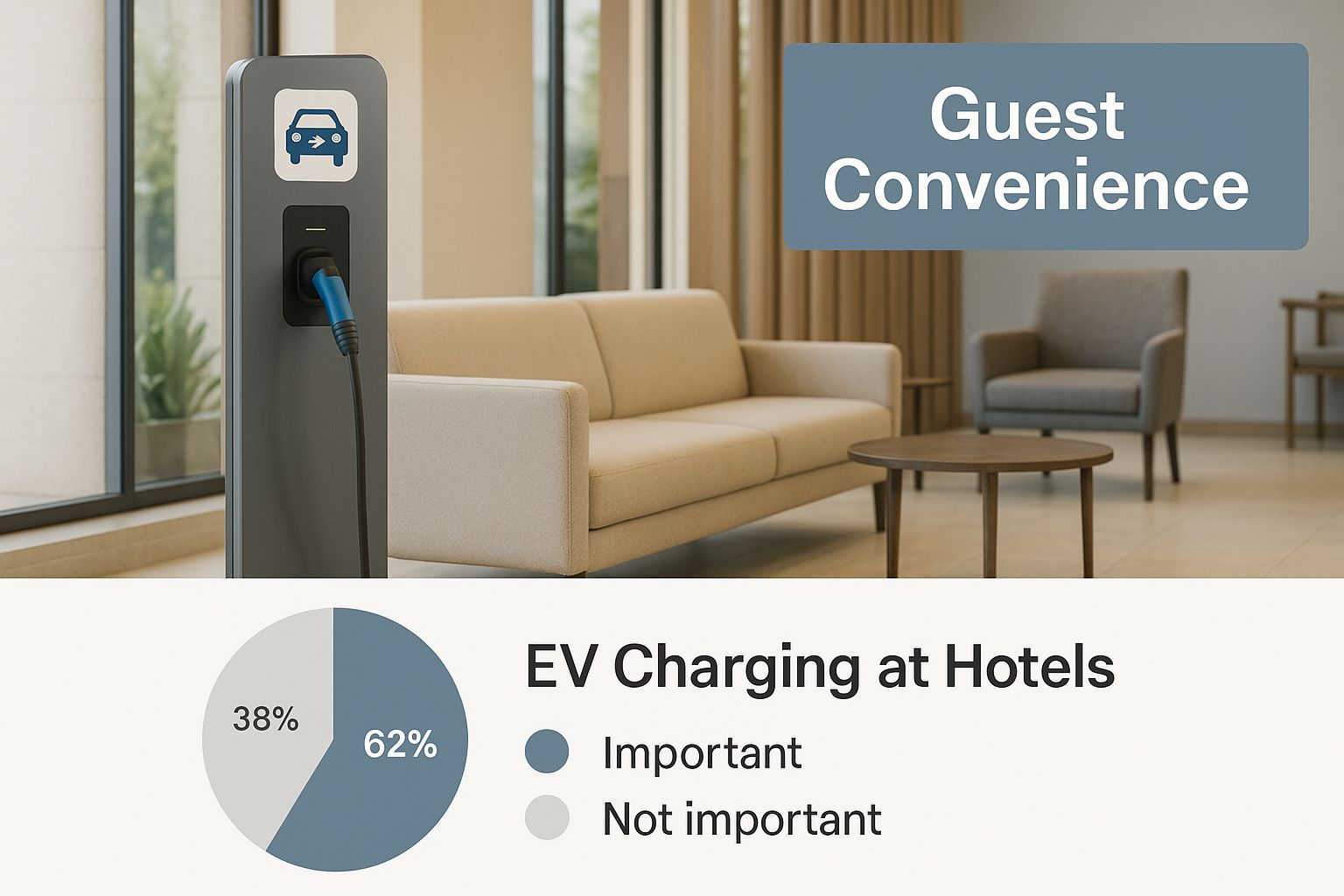
The image really hits on a core principle of modern hospitality: making essential services effortless for the guest. It is not about forcing them to adapt to your infrastructure; it is about providing a solution that fits neatly into their stay.
This flexibility really shines in several real-world scenarios:
- Handling Peak Demand: A large conference or wedding can bring a sudden influx of EV drivers. With a mobile fleet, you can deploy chargers to meet this surge, ensuring every guest who needs a charge gets one.
- Creating A Premium 'Valet' Service: Imagine your staff delivering a charger directly to a guest's vehicle. It is a high-touch, luxury service that eliminates the need for guests to find a specific bay or move their car. That is a seamless experience they will remember.
- Optimising Car Park Usage: You are never left with an empty, dedicated EV bay. Every space remains available for any guest, ensuring you get maximum efficiency from one of your most valuable assets—your car park.
Mobile vs Fixed EV Chargers: A Hotel's Perspective
When you lay it all out, the advantages of a mobile approach become crystal clear. It is not just about the money; it is about a smarter, more guest-centric way of operating. To make it simple, let's compare the two options directly from a hotelier's point of view.
| Feature | Mobile Charging Solution | Fixed Charging Installation |
|---|---|---|
| Initial Cost | Low capital outlay, minimal setup required. | High investment in hardware, groundwork, and electricals. |
| Installation | Plug-and-play setup, operational within hours. | Lengthy and disruptive, involving construction and permits. |
| Scalability | Easily add more units as demand increases. | Difficult and expensive to expand once installed. |
| Flexibility | Charge any car in any parking space. | Limited to dedicated, specially marked bays. |
| Guest Experience | Premium 'valet' service delivered to the car. | Guests must find and move to a specific charging bay. |
| Revenue Model | Start earning from day one with minimal risk. | Long ROI period due to high initial costs. |
Ultimately, mobile charging empowers hotels to be more responsive, profitable, and guest-focused. It removes the traditional barriers to entry, offering a practical path for ev charging hotels to capture the lucrative EV driver market without the financial strain and operational headaches of permanent infrastructure. You can start small, prove the concept, and build a new, reliable revenue stream for your business.
Forecasting Your Revenue and Return on Investment
Adding a mobile EV charging service is not just about offering another guest amenity; it is a solid financial decision designed to boost your bottom line. To really grasp the opportunity, you have to look beyond simply charging for electricity and see the web of interconnected revenue streams it creates. Working out your potential return on investment (ROI) means forecasting both the direct income and the equally important indirect financial benefits.
The real beauty of mobile charging is its low barrier to entry. You can start generating revenue almost immediately without the eye-watering capital expense that comes with fixed installations. This lets you test different pricing models and tweak your strategy with minimal risk, making sure the service pays for itself from day one. In a market that is changing this fast, that kind of agility is gold.
Mapping Your Direct Revenue Streams
The most obvious income comes straight from charging fees. This is your chance to create a significant new profit centre. With mobile charging, you control the pricing, allowing you to set a tariff that generates a healthy margin on every kilowatt-hour sold.
Here are a few proven models that work well for hotels:
- Pay-per-kWh: This is the most straightforward and transparent method. Guests pay for the exact amount of energy they use, plus a premium for the convenience. It’s fair, easy for guests to understand, and mirrors the public charging network they’re already used to. You can set a profitable rate that far exceeds your electricity cost.
- Flat Overnight Fee: Simplicity itself. Offering a single, fixed price for a full overnight charge takes all the guesswork out of it for your guests. This model allows for a high-margin, premium price point, positioning the service as a valuable convenience rather than a simple utility.
- Premium Package Bundles: This is a smart way to upsell. Roll the charging into your higher-tier room packages. A guest booking a suite could get 'complimentary' EV charging as part of the deal, justifying a higher room rate and instantly making your premium rooms feel like better value.
The trick is to stop thinking of charging as a utility and start treating it like a high-value service that can be tailored to improve the guest experience while driving direct profit.
The Financial Impact of Ancillary Spending
While direct fees provide a strong, steady income stream, the real financial powerhouse here is the surge in ancillary revenue. When guests are charging their vehicles overnight, they are far more likely to stay on-site, effectively turning your hotel into their evening's destination.
Think about the typical behaviour of a guest with an EV:
- Restaurant and Bar: Instead of heading out to find dinner, they will almost certainly eat at your restaurant. Industry data shows that hotels with EV charging report an average increase of £30-£50 per occupied room in food and beverage spending.
- Spa and Leisure: That downtime while the car is charging is the perfect window for guests to book a spa treatment or use other paid facilities. It is another layer of on-site spend you would not have captured otherwise.
- Extended Stays: A hotel that offers reliable charging becomes a strategic 'home base'. Guests are much more likely to book an extra night, knowing they can explore the region all day and come back to a full battery.
Offering EV charging effectively creates a captive audience. By removing the need for guests to leave your property, you capture a much larger share of their total travel budget.
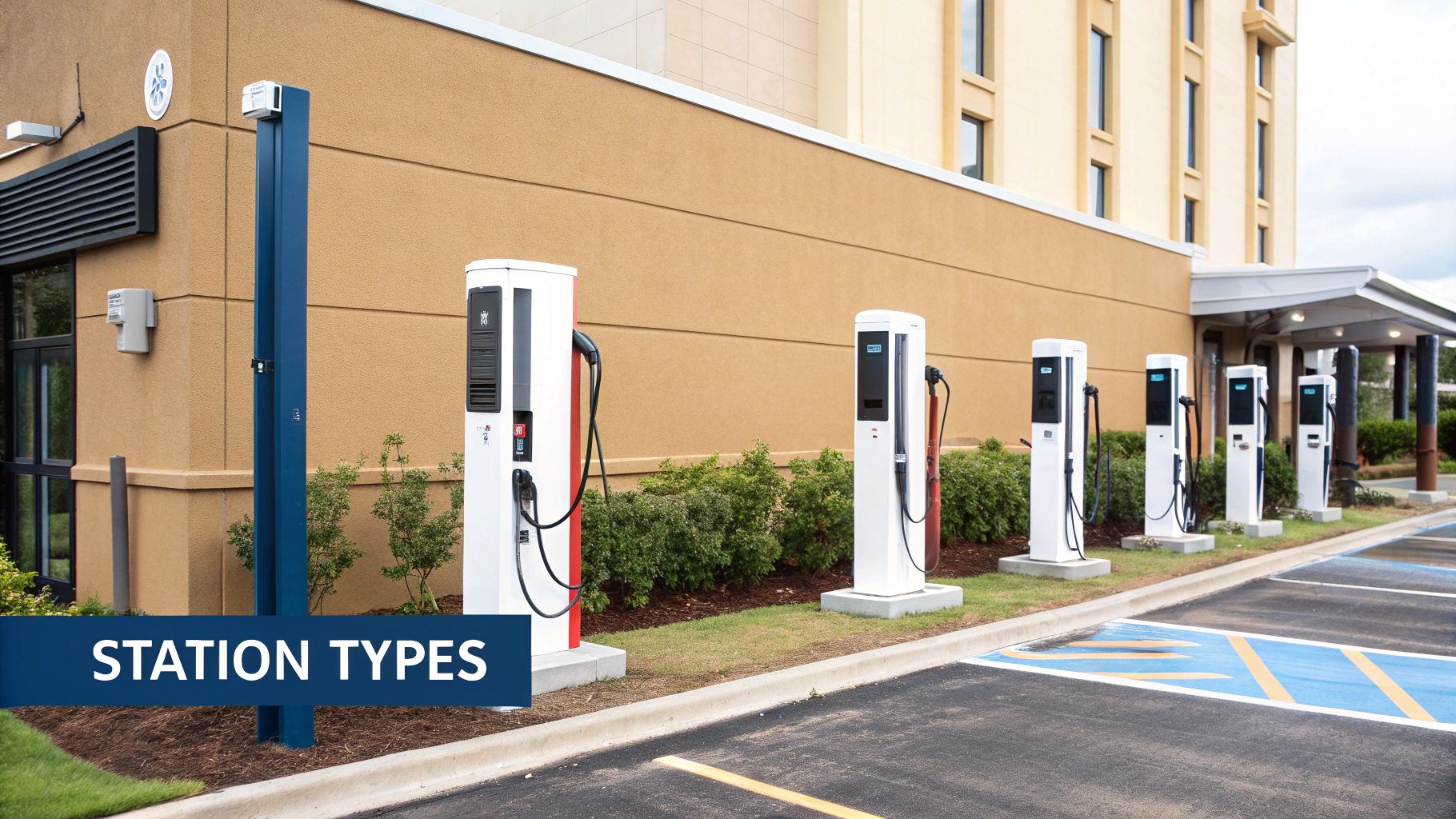
Calculating Your Return on Investment
To really bring this to life, let's look at a couple of realistic scenarios for hotels offering mobile EV charging.
Scenario A: The Countryside Boutique Hotel
Imagine a 30-room boutique hotel brings in a small fleet of mobile chargers. They decide on a premium flat-fee model of £25
for an overnight charge.
- Direct Revenue: With just five EV-driving guests a week, they generate an extra £125 weekly. That adds up to £6,500 annually, just from the charging fees.
- Indirect Revenue: These are guests who might have stayed elsewhere. Now, they are dining in the hotel's well-regarded restaurant. If we assume an average dinner spend of £100 per couple, that is an additional £26,000 in food and beverage revenue over the year.
Scenario B: The City-Centre Conference Venue
Now picture a 200-room hotel that caters to business travellers. They use a pay-per-kWh model and handle 20 charging sessions a week during conferences.
- Direct Revenue: By charging a competitive but profitable rate, they can easily bring in over £10,000 a year from the service alone, with a very quick return on the initial hardware investment.
- Competitive Advantage: Here is the kicker. They win a major conference contract—worth tens of thousands—specifically because they could guarantee charging for all the executive attendees. Their competitors simply could not make that promise.
In both of these real-world examples, the initial investment in mobile chargers is paid back within months, not years. And that is before you factor in the "hidden" returns, like securing those big bookings, getting glowing online reviews that mention the convenience of EV charging, and building a stronger, more forward-thinking brand image.
For hoteliers looking to dig into the numbers, exploring the various options for the finance of EV chargers for businesses can map out a clear path to profitability. This service quickly stops being a simple cost and becomes a powerful, multifaceted profit centre.
A Practical Guide to Site Setup and Installation
Putting a mobile EV charging service in place is a surprisingly straightforward process, designed for minimal disruption to your hotel's daily rhythm. Unlike the heavy construction that comes with fixed charging points, getting started with mobile units is more about smart planning than major engineering. The goal here is to demystify the setup and show you it is a far less complex and costly undertaking than many hoteliers assume.
The first step is a simple but vital assessment of your current electrical infrastructure. Mobile chargers need a central ‘hub’ to recharge when they are not in use—think of it as their home base. This does not require a bespoke, high-power installation; often, an underutilised storeroom, maintenance area, or even a sheltered part of the car park with existing power sockets will do the job perfectly.
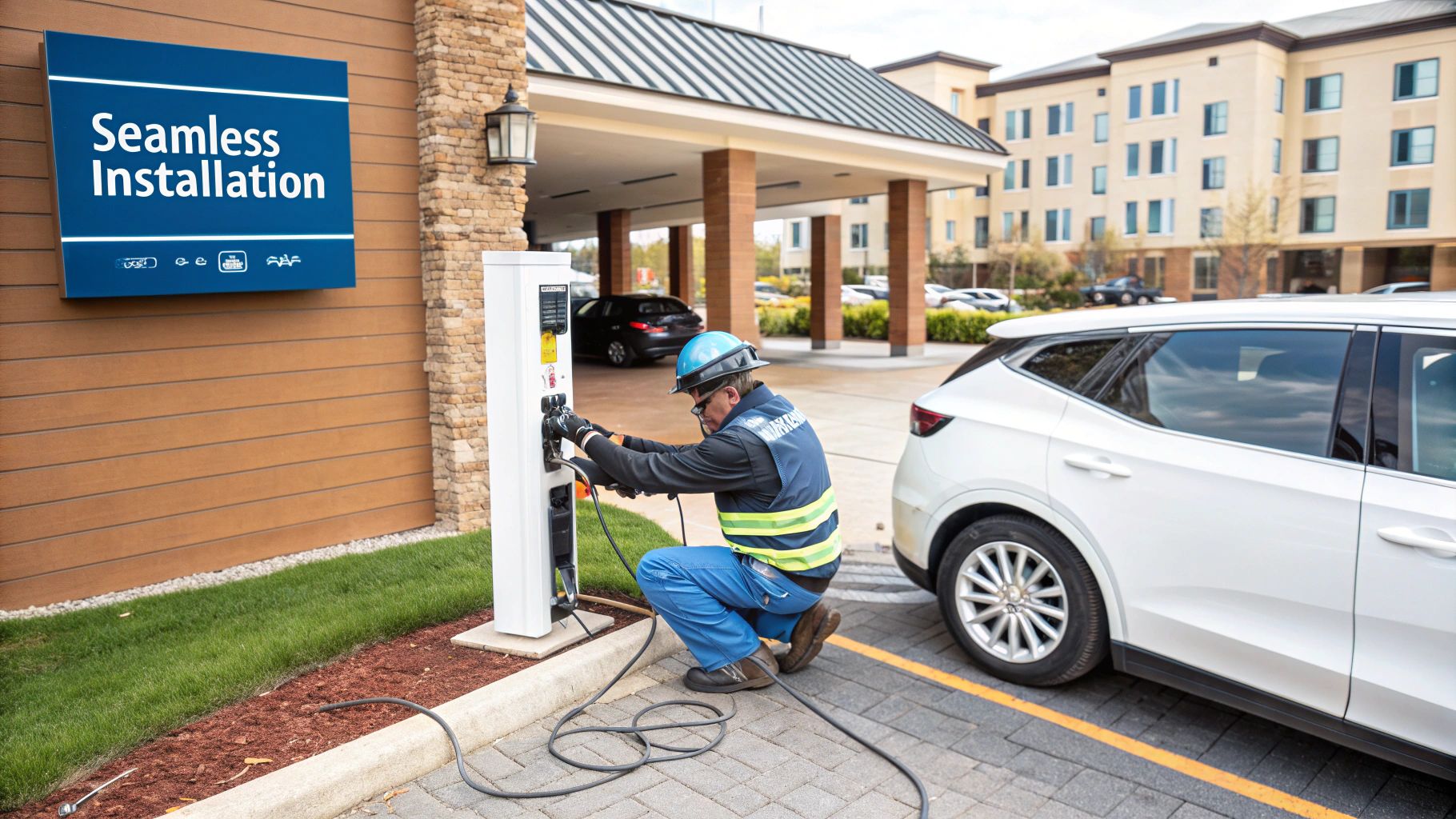
Assessing Your Electrical Capacity
Before you do anything else, you need to get a clear picture of your site's power capabilities. This is to make sure you can recharge your fleet of mobile units efficiently without putting a strain on your main supply, especially during peak times like evening service in your restaurant.
A quick consultation with a certified electrician is essential here. They will help you:
- Identify suitable sockets: They’ll look for existing industrial CEE sockets, which are perfect for charging the mobile units quickly and safely.
- Evaluate circuit loads: The electrician will confirm that the circuits can handle the additional load of several chargers recharging simultaneously overnight.
- Suggest minor upgrades if needed: In most cases, existing infrastructure is more than sufficient. If not, the required upgrades are typically minor and localised to the hub area, avoiding any widespread disruption.
The whole process is about working with what you already have, not starting from scratch. Good power management is key to ensuring that offering EV charging for hotels slots smoothly into your operations without causing any electrical headaches.
Training Your Team for Success
Your staff are the face of this new service, and their confidence will directly shape the guest experience. Proper training is what transforms a good amenity into a great one, ensuring your front desk, concierge, and valet teams are all well-prepared.
Training should be practical and focused, covering just the essential knowledge so your team can handle guest interactions smoothly and professionally.
A well-trained team can turn a simple charging request into a memorable moment of premium service. When staff can confidently explain the process, manage bookings, and answer questions, it elevates the entire guest experience and reinforces your hotel's commitment to quality.
Key training areas should include:
- Explaining the Service: Staff should be able to clearly articulate how mobile charging works, including pricing, estimated charging times, and the convenience of the 'valet' style service.
- Handling Requests: This covers the simple process for taking a guest's request, scheduling the charge, and ensuring the service is delivered promptly.
- Basic Troubleshooting: Team members should know how to handle common issues, like ensuring the charger is properly connected to the vehicle or rebooting a unit if needed.
With mobile chargers becoming an increasingly popular choice for the hospitality sector, it is worth exploring the different models available. You can browse a range of powerful and user-friendly Zapme mobile EV chargers to see what might best suit your hotel's specific needs.
The Growing Importance of Destination Charging
The UK's charging infrastructure is expanding at a remarkable pace, with a clear trend towards 'destination' charging. By July 2025, there were 82,002 publicly available EV charging devices across the UK, a 27% increase from the previous year.
Almost half ( 49% ) of these are destination chargers in places like hotels, retail parks, and shopping centres—locations where vehicles are parked for longer periods. This really highlights just how relevant and expected this amenity has become in hospitality. You can explore more about this trend and find additional electric vehicle charging statistics on GOV.UK.
By focusing on these practical steps—a simple site assessment, targeted staff training, and choosing the right equipment—you can launch a successful mobile EV charging service with confidence and minimal fuss.
Marketing Your EV Facilities to Attract More Guests
Once your mobile charging service is up and running, the real work begins: making sure potential guests know about it. Simply having the facility is not enough. Proactive marketing is what turns your investment into a reliable stream of new bookings and ensures you appear in front of EV drivers at the exact moment they are planning their journey.
This means going beyond a simple note on your website. You need a strategy that places your hotel directly in the path of this valuable guest demographic, making your ‘EV charging available’ amenity a primary reason for them to book with you over your competitors.
Optimising Your Digital Shopfront
Your hotel’s website and its listings on Online Travel Agents (OTAs) are your most powerful marketing tools. When an EV driver searches for accommodation, these are the first places they look. It is vital that your charging amenity is not just mentioned, but featured prominently.
- Update Your Website: Create a dedicated landing page about your EV charging service. Detail how it works, the pricing, and really sell the convenience of your mobile 'valet' service. Use high-quality photos of the chargers in action.
- Refresh OTA Listings: On platforms like Booking.com and Expedia, make sure ‘EV Charging’ is selected as a key amenity. This is often a filter people apply, so failing to tick this box means you are invisible in their search results.
- Leverage Google Business Profile: Update your profile to include EV charging. This is crucial for appearing in local searches like "hotels with EV charging near me," a common query for drivers already on the road.
Connecting with the EV Community
EV owners are a passionate and highly connected group. They actively share information about good (and bad) charging experiences in online forums, social media groups, and specialised apps. Tapping into these communities is a low-cost, high-impact way to build a strong reputation.
Getting your hotel listed on essential EV mapping apps is non-negotiable. For a UK driver, apps like Zapmap are the go-to resource for planning any journey. Appearing on these maps puts you directly on their route and makes your hotel a planned destination, not just a possibility.
The next step is to engage directly. Consider running targeted social media campaigns aimed at EV owner groups on platforms like Facebook. A simple post announcing your new service, perhaps with an introductory offer, can generate huge word-of-mouth promotion within this tight-knit audience.
Creating Irresistible Offers
To truly stand out, bundle your charging service with accommodation to create compelling packages that appeal directly to an EV driver's needs. This shifts the perception of charging from a simple utility to part of a premium, seamless travel experience.
For example, you could create an ‘EV Driver’s Getaway’ package. This could include:
- An overnight stay in a premium room.
- A guaranteed, fully-managed overnight charge for their vehicle.
- A complimentary drink at the bar while their car charges.
- Late check-out to provide extra charging time if needed.
These tailored packages make your offer far more attractive and can easily justify a higher room rate. By marketing your new amenity thoughtfully across multiple channels, you ensure that your investment does not just sit in the car park—it actively drives bookings and boosts your revenue.
Your Top Questions About Hotel EV Charging Answered
Bringing any new service on board is going to come with questions. When it is something like mobile EV charging, hoteliers understandably want to know about the costs, the logistics, and how it will really impact the guest experience. Getting straight answers is the only way to make a decision that feels right for your property.
One of the first things that comes to mind is the day-to-day management. The UK hospitality industry is catching on fast to the benefits of EV charging, but the thought of juggling multiple chargers can seem a bit much. Thankfully, modern mobile systems are designed for simplicity, with straightforward tools that let your team see usage, sort out billing, and schedule charging sessions without any fuss. It also opens the door to clever service bundles, like a premium room package that includes complimentary charging—a great way to stand out. You can find more detail on EV charging for the hospitality industry from Electrassure.
How Much Can We Realistically Charge Guests?
This is where you have complete control. Your pricing strategy for mobile EV charging can be tailored to fit your business goals perfectly. You can treat it as a direct profit centre, or you can use it as a powerful amenity to draw in more guests. There is no single right answer.
Here are a few popular models I have seen work well:
- A simple per-kilowatt-hour (kWh) rate: This is the most transparent approach. Guests pay for the energy they use, plus a small margin for the convenience. EV drivers are already familiar with this model, so it feels fair and straightforward.
- A flat overnight fee: I love this for its simplicity. Guests pay one price for a full charge, taking all the guesswork out of it. It is an easy, attractive, and completely hassle-free option.
- Bundled with room packages: Why not roll the cost of charging into your premium room rates? It makes your higher-tier offerings feel even more valuable and easily justifies the higher price point.
What Kind of Electrical Setup Is Needed?
This is the best part. One of the biggest advantages of mobile charging is how little it impacts your existing infrastructure. Unlike fixed wallboxes that need dedicated, high-power circuits run to every single parking bay, mobile chargers are far less demanding.
They can be recharged from standard industrial sockets—the kind you probably already have in your maintenance areas or car park. A quick site assessment from a qualified electrician is all it takes to confirm your capacity and pinpoint the best spot for a central 'hub' to recharge the units. This approach completely sidesteps the cost and disruption of digging trenches across your property.
Mobile charging systems are designed to work with what you already have. This flexibility significantly lowers the barrier to entry, making it faster and far more affordable to start offering a premium EV charging service.
How Fast and Reliable Are These Mobile Chargers?
Mobile chargers typically deliver Level 2 charging at around 7kW . For a hotel, this is the perfect speed. It adds roughly 25-30 miles of range per hour, which is more than enough to give a guest’s car a full charge while they sleep.
They are not as lightning-fast as the big DC chargers you see on the motorway, but they are not supposed to be. They are built for 'destination charging'—situations where a vehicle is going to be parked for several hours anyway. Good-quality mobile systems are built for tough commercial use and deliver the same reliable performance you would expect from a fixed wallbox with an equivalent power rating. Your guests will wake up with a full battery, ready for their journey ahead.
Ready to turn your car park into a profit centre and attract a new wave of high-spending guests? Discover how ZAPME can provide a flexible, scalable, and cost-effective mobile EV charging solution for your hotel. Visit us at https://www.zapme.biz to learn more.

